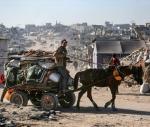You are here
To survive, Lebanon needs a revolution that delivers Lebanese people from want, despair
May 06,2020 - Last updated at May 06,2020
In an unprecedented call for action on Lebanon's turbulent domestic front, the UN Security Council has urged the Lebanese authorities "to respond to the aspirations of the Lebanese people by implementing meaningful economic reforms" and addressing security, humanitarian and coronavirus challenges. On the virus, Lebanon has, unexpectedly, done well, but it has stalled reforms, unwisely attempted to crack down on protesters, and delivered little aid to famished families.
Having successfully contained the coronavirus with lockdown, Lebanon began returning to business on Monday as divisions opened between the government and opponents over the handling over the long-awaited reform plan put forward on April 30. The plan lays out reforms that could secure $11 billion in funding from international lenders offered in 2018 and, on the basis of the plan, the government proposes that the International Monetary Fund (IMF) grant a second loan of $10 billion over five years. If Lebanon manages to get both, the total sum will amount to only 25 per cent of the $80 billion economists say is needed to exit the country’s economic crisis.
Despite Lebanon’s economic melt-down, the plan was promptly rejected by the powerful banking sector. The Sunni Future Movement objected to a role for President Michel Aoun in securing the approval of the plan by parliamentary parties. Shia Hizbollah praised the plan, accepted government dialogue with the IMF but warned against surrendering to IMF dictation. This is good advice because the IMF's imposition of austerity measures often harms the poorest members of populations accepting IMF terms.
The banks object to the fact that they were not consulted when the plan was drafted as well as to the government's appeal to the IMF for help in trying to rescue the country collapsing economy. The banks, which hold most of
Lebanon's debt, argue the plan will "further destroy confidence in the country." The banks reject plan provisions to recoup financial sector losses by means of a bank bail-in that would harm shareholders and take cash from large depositors who would, perhaps, be repaid. The banks' argument that confidence would be lost in Lebanon's financial sector does not hold water at it has already been destroyed by decades of mismanagement, corruption and the refusal of the political and financial elite to carry out essential reforms.
The bankers have said they will present their own rescue package within two weeks when some sources report the IMF will give its reaction to the government's plan; others say the IMF response will not come for six weeks.
Lebanese do not have six weeks to waste. Formerly, the hub of the revolution launched last October, the northern port of Tripoli has become the hunger protest capital of the country. Demonstrators who turned violent when confronted by the army last week compelled the weak technocratic government headed by Hassan Diab, a Sunni academic with no political faction behind him, to issue the rescue plan. Such a plan had been delayed since Saad Hariri resigned as prime minister at the end of October during the height of mass protests against mismanagement, corruption and the confessional political system imposed on Lebanon by France before independence in 1943.
For the protesters, banks represent inequality and exploitation. Lebanese focus, in particular, on the Central Bank which is blamed for the plunge of the Lebanese Lira from 1,500 to 4,000 to the US dollar. The costs of food, fuel, electricity and water have soared and banks have rationed money withdrawn by depositors since mid-October. Hotels, restaurants, cafes, shops, businesses and markets have closed, laying off or firing thousands of employees.
Returning to the streets after the government began to ease lockdown and closures restrictions imposed since Covid-19 took hold and spread in Lebanon, protesters say they have a choice of "dying from hunger or dying from coronavirus" by ending social distancing. They know full well that external funding depends on financial reforms, anti-corruption measures and effective management of the economy.
While the world Bank estimates that 45 per cent of Lebanese live below the poverty line, citizens of Tripoli, a once prosperous city and the north complain about 57-60 per cent unemployment and deepening deprivation. This is why Tripoli has revolted and Tripolitanians have smashed and burned banks and braved a crack-down by the army and security forces. Tripolitians cannot survive on soup kitchens and handouts from charities. They need jobs with decent incomes, good schools and health services, electricity, water, roads and affordable rents. Lebanese from all over the country have travelled to Tripoli to join its protests, projecting Lebanese nationalism over locality and sect.
To achieve their ends, Lebanese insist the country must abandon the sectarian system of governance which dictates that the president must be a Maronite Christian, the prime minister a Sunni and the parliamentary speaker a Shia. This being the case, it is certain that the deeply entrenched politicians will continue to do their utmost to scupper or postpone reforms that would deprive them of status and advantages. Lebanon cannot afford to tolerate this behaviour. Long ago dubbed the "Paris of the Middle East, Beirut cannot become the sad capital of a failed state.
To survive, Lebanon needs a revolution: not only a revolution of the hungry but a revolution that will deliver the awakened and angry Lebanese people from want and despair.













